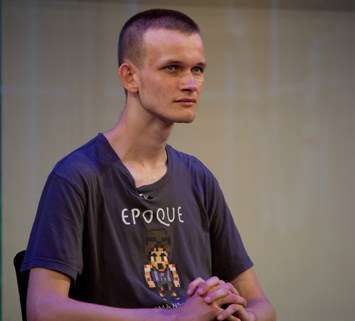Here Comes Ethereum, an Information Technology Dreamed Up By a Wunderkind 19-Year-Old That Could One
- OurStudio

- Mar 19, 2015
- 3 min read

Jim Epstein
Ethereum, the brainchild of wunderkind software developer Vitalik Buterin, who was just 19 when he came up with the idea, is the most buzzed-about project right now in the cryptocurrency community. It has attracted an all-star team of computer scientists and raised $18.4 million in a crowdfunding campaign—the third most successful of all time. And now, according to the official Ethereum blog, it's on the verge of being rolled out to the public.
Ethereum's developers use a rolling ticker tape of bold tag lines to describe what they're creating, including a "Social Operating System for Planet Earth," and "the Upcoming Decentralization Singularity."
So what is it?
Ethereum is a programming language the lives on top of a "blockchain"—a concept invented six years ago with the launch of Bitcoin. A blockchain is essentially a database that's jointly maintained on the personal hard drives of its users—sort of like a shared Microsoft Excel spreadsheet. But transactions recorded to a blockchain are time stamped, fully transparent, and protected from tampering by hackers and thieves through an ingenious system that utilizes cryptography and community consensus. Blockchains make it possible, for the first time in history, to participate in a complex marketplace without the need for a mediating third party. The blockchain is what allowed Bitcoin to become the first form of virtual money that can be exchanged without a bank serving as an intermediary. (Read Ron Bailey's recent piece on the blockchain's transformative potential.)
Ethereum is an effort to apply the blockchain to a broad range of uses, though it's not the first such attempt. Projects like Counterparty and Colored Coins have come up with clever methods of tailoring Bitcoin to facilitiate projects like a blockchain-based stock market. But Bitcoin's blockchain was designed to handle the exchange of money, and retrofitting it to other uses requires some programming jujitsu and has inherent technical limitations.
Ethereum tries to solve this problem by layering a powerful programming language on top of a blockchain, giving it all the versatility that Bitcoin lacks.
"If you think of Bitcoin as a decentralized version of Microsoft Excel, then Ethereum is a decentralized Excel where we've made the visual basic macros functional," says Vinay Gupta, the project's release coordinator. To expand on Gupta's analogy: With the Bitcoin blockchain, each cell on this hypothetical Excel table holds just a number; on the Ethereum blockchain, each cell is home to an entire computer program.
So what's the advantage of hosting computer programs on a blockchain? They become much cheaper to operate because no third-parties are required to oversee their operation, and they become essentially incorruptible because their functioning is fully transparent.
Ethereum's developers believe their project will lead to the proliferation of programs they call "smart contracts," in which the terms of an agreement are written in code and enforced by software. These smart contracts could carry out the instructions of a complex algorithm based on data feed—such as a stock ticker. They could facilitate practically any financial transaction, such as holding money in escrow or dispersing micropayments among autonomous machines. They could be used to create a peer-to-peer gambling network, a peer-to-peer stock trading platform, a peer-to-peer social network, a prenuptial agreement, a will, a standard agreement to split a dinner check, or a public registry for keeping track of who owns what land in a city.
Gupta predicts that these smart contracts will be so cheap and versatile that they'll do "a lot of things that today we do informally," and take on a lot of the "donkey work of running a society."
There won't be any big changes on the day—or year—after Ethereum is released, in part because many smart contracts will work best when the people using them keep their money in Bitcoin or other forms of programmable money. That's because the fiat money world still depends on trusted third parties. For example, a will written as a smart contract can't be fully automated if the money to be dispersed is entirely in U.S. dollars; a banker would need to cooperate. But Gupta predicts that fairly soon we'll move to a world in which a critical mass of people maintain a wallet with at least a few hundred dollars worth of cryptocurrency, facilitating Ethereum's rapid integration into the real economy.
Ethereum-based public databases, which don't depend on widespread use of cryptocurrency, could have a more immediate impact, particularly in the developing world. Take land ownership. U.S. cities maintain software databases of who owns what land, and since our public institutions are relatively functional, these systems work well enough that there isn't a pressing need for them to live on a blockchain.
But in the developing world, government's basic functions are often hobbled by corruption and bureaucracy. So a public land database on a fully transparent and community-operated blockchain could make the real estate market functional in these cities. As with Bitcoin, the big challenge ahead for Ethereum is getting people to use it.




Comments